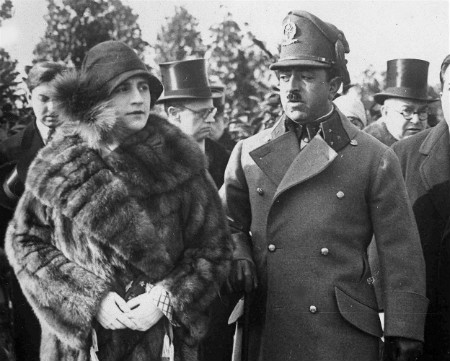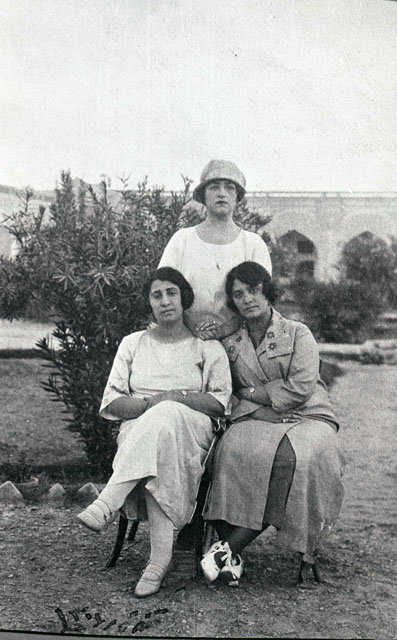Afghanistan is one of the poorest countries in the world, and near the bottom on the Human Development Index. Riddled with corruption and extremism, Afghanistan is struggling to join the modern world. However, for a brief time in the early 20th century, Afghanistan made huge steps forward under the leadership of King Amanullah.
King Amanullah started off his reign in 1919 by declaring complete Afghan independence from the British Empire in his coronation speech. Afghanistan had been under British rule in some form or another since 1838, and at that time, Britain had complete control over Afghanistan's foreign affairs and an outsized influence on its domestic affairs. The Afghans were, of course, not 100% down with this, and Amanullah's declaration of independence was greeted with enthusiasm. He started the Third Anglo-Afghan war on May 6, 1919. The fighting lasted for about a month, and at the end, Afghanistan emerged an independent country.
With the British problem taken care of, Amanullah set about a reform regime that would bring Afghanistan into the modern world and improve the quality of life for almost every citizen.
Amanullah was firmly of the opinion that education was vital to a prosperous society. He made elementary school mandatory for both boys and girls and opened up schools in rural areas. Furthermore, he secularized schools and significantly expanded the curriculum. Previously, schools had been run by Islamic clerics and had focused mostly on memorizing the Quran. While schools still taught Islamic law and principles, they also branched out into math, science, and reading.
Amanullah's first major reforms in the army department was the creation of an air force. With help from the USSR, he assembled a small fleet of planes with a small force of Soviet pilots to fly them. Afghans were sent to France, Italy, and Turkey to learn to fly, and gradually, Afghan pilots replaced the Soviets.
This small salary was a byproduct of Amanullah's attempts to purge the Afghan army of its veterans. Many veterans, though experienced, were loyal to tribal chiefs and were resistant to the changes that Amanullah was introducing. To induce them to quit, Amanullah lowered their salary to four rupees a month. This was largely successful, and many of the more experienced soldiers left the service.
Unfortunately, nobody thought to train the new soldiers that would replace them. Amanullah brought in officers from the Turkish army to train his army, but many Afghan soldiers resented the Turkish influence, and saw it as an insult that they were expected to learn from the Turks. This, combined with failure to provide sufficient food, clothing, and housing, led to the army becoming disillusioned with the king.
While Amanullah made some undeniably good changes, the manner in which he went about it irritated and alienated his people. At the beginning of his reign, he'd been encouraged to introduce reforms gradually, but Amanullah disregarded that advice. He introduced 57 different reform laws in the first five years of his reign, which resulted in an uprising in 1924. He lacked a competent bureaucracy to enforce his reforms, and outside of Kabul, it was nearly impossible to enforce the new changes. By secularizing the laws and creating state courts, Amanullah alienated the mullahs, who declared him an infidel. His military reforms made it so that when the tribes rebelled in 1929, his armed forces were not only unable but were also unwilling to put it down, resulting in Amanullah's abdication and the reversal of his reforms.
This article was edited by Mara Kellogg.
Afghanistan-the Reign of King Amanullah. 1919-29-Country Studies
Reforms of Amanullah Khan and Civil War-California Polytechnic State University
 |
| Amanullah and his wife, Queen Soraya. Soraya was behind many of Amanullah's reforms, and served as the public face of his reforms in women's rights. |
With the British problem taken care of, Amanullah set about a reform regime that would bring Afghanistan into the modern world and improve the quality of life for almost every citizen.
Government
After throwing off the English, Amanullah set about attempting to unite a divided country. Some of his efforts were small, like encouraging government officials to wear Western dress in order to erase tribal and religious divisions; others were bigger, like creating a constitution and purging corruption from the highest levels of society.
The Afghan Constitution, ratified in April of 1923, introduced bicameral legislation, a secular court system, and a series of checks and balances in which the king became a constitutional monarch. The 1923 constitution was revolutionary. It offered freedom of speech, freedom of religion, freedom of the domestic press, and made it possible to not only present petitions to a court but appeal those decisions to a higher court. It declared that the king was accountable to the country and that he ruled Afghanistan at the leisure of the people. Some local government positions became elected, and warrants were required for arrest.
Amanullah revolutionized the Afghan budget by having one. Before the 1923 constitution, Afghanistan had run without a budget. Amanullah not only established a budget, but he also sought to improve the economy of the country by replacing the valueless rupee with the afghani and by selling farmland to poor farmers at only ten afghanis for a half acre.
There was also a significant improvement to infrastructure during Amanullah's time. He connected the entire country with "The Great North Road," which enabled people to get quickly from one part of the country to the other. He created a postal service and installed telegraphs and telephones. He also decided to build a new capital, Darul-Aman.
All of this would be very expensive. To pay for it, Amanullah reformed the tax system, getting rid of archaic and arbitrary taxes (like the "Tax for the Queen's Hair Oil") and by levying higher taxes on land and livestock. During Amanullah's reign, the tax on land increased four-fold, and the tax on livestock increased five-fold.
In a series of decrees, Amanullah also revoked the special privileges that had previously been offered to tribal and Islamic leaders. He cut tribal subsidies and abolished traditional ranks and titles. Mullah's were no longer allowed to preside over court cases. This would, unsurprisingly, make him very unpopular with the upper classes.
Social
Amanullah formally abolished slavery in article ten of the 1923 constitution. The article read:
"Personal freedom is immune from all forms of violation or encroachment. No person may be arrested or punished other than pursuant to an order issued by a Sharia Court or in accordance with the provision of appropriate laws. The principle of Slavery is completely abolished. No man or woman can employ others as slaves."This was one of Amanullah's many attempts to unify fractured Afghan society. Previously, slaves had come from religious minorities or rival tribes, and not only was slavery a gross violation of civil rights, it was dividing a country that needed more than ever to be united.
 |
| Afghans, especially women and high- ranking officials were encouraged to adopt western-style clothing. |
Education wasn't just for children either. Literacy classes for adults were offered, with Amanullah sometimes making an appearance to teach them himself. Higher education was also encouraged, with many Afghan students being sent abroad to go to school with the expectation that they would bring their skills back to benefit their nation.
What Amanullah is perhaps best remembered for (other than throwing out the British for once and for all) was his promotion of women's rights and his reforms that gave women a degree of freedom that hadn't been seen in Afghanistan before or since. Veiling was no longer mandatory. Seclusion was discouraged. Women were not only allowed to go to school, but the law said that girls had to attend elementary school same as the boys did. Several women were sent to college in Turkey, and working outside of the home began to seem possible.
In addition to being able to receive an education, women were also granted the rights to seek a divorce, and have a say in who they married. A woman's consent to marry was just as important as a man's. Amanullah outlawed the practice of bride money and passed laws saying that a woman wasn't allowed to marry until after she hit puberty.
Amanullah also discouraged polygamy and passed laws that said to take a second wife, a man had to appeal to the courts. This caused a major backlash from the religious community.
In addition to being able to receive an education, women were also granted the rights to seek a divorce, and have a say in who they married. A woman's consent to marry was just as important as a man's. Amanullah outlawed the practice of bride money and passed laws saying that a woman wasn't allowed to marry until after she hit puberty.
Amanullah also discouraged polygamy and passed laws that said to take a second wife, a man had to appeal to the courts. This caused a major backlash from the religious community.
Military
 |
| Bacha-i-Saqao, the Tajik rebel who would eventually overthrow Amanullah. |
His second major military reform was to turn the Afghan army into something that more resembled an actual army. Pre-Amanullah, soldiers for the army had been chosen by the tribal chiefs. This meant that soldiers were usually more loyal to their tribes then they were to the state. This was a particular problem any time a tribal uprising came around, and tribal uprisings came around more frequently than Amanullah would have liked. To counter this, Amanullah introduced universal conscription. All men would serve three years in the army when they turned 21. They would live in army-provided housing and be provided with food and clothing, as well as a very small salary.
This small salary was a byproduct of Amanullah's attempts to purge the Afghan army of its veterans. Many veterans, though experienced, were loyal to tribal chiefs and were resistant to the changes that Amanullah was introducing. To induce them to quit, Amanullah lowered their salary to four rupees a month. This was largely successful, and many of the more experienced soldiers left the service.
 |
| Amanullah shortly before his death in 1960. After his abdication Amanullah fled abroad and lived in exile in Switzerland. |
While Amanullah made some undeniably good changes, the manner in which he went about it irritated and alienated his people. At the beginning of his reign, he'd been encouraged to introduce reforms gradually, but Amanullah disregarded that advice. He introduced 57 different reform laws in the first five years of his reign, which resulted in an uprising in 1924. He lacked a competent bureaucracy to enforce his reforms, and outside of Kabul, it was nearly impossible to enforce the new changes. By secularizing the laws and creating state courts, Amanullah alienated the mullahs, who declared him an infidel. His military reforms made it so that when the tribes rebelled in 1929, his armed forces were not only unable but were also unwilling to put it down, resulting in Amanullah's abdication and the reversal of his reforms.
This article was edited by Mara Kellogg.
Sources
The Pitfalls of Protection: Gender, Violence, and Power in Afghanistan by Torunn Wimpelmann
"History Lessons: In Afghanistan's Decades of Confrontation with Modernity, Women Have Always Been the Focus of Conflict" by Christine Noelle-Karimi
"Abandoning the Wardrobe and Reclaiming Religion in the Discourse on Afghan Women’s Islamic Rights" by Leela Jacinto
Afghanistan-Reform, Popular Reaction, and Forced Abdication-Country StudiesAfghanistan-the Reign of King Amanullah. 1919-29-Country Studies
Reforms of Amanullah Khan and Civil War-California Polytechnic State University


